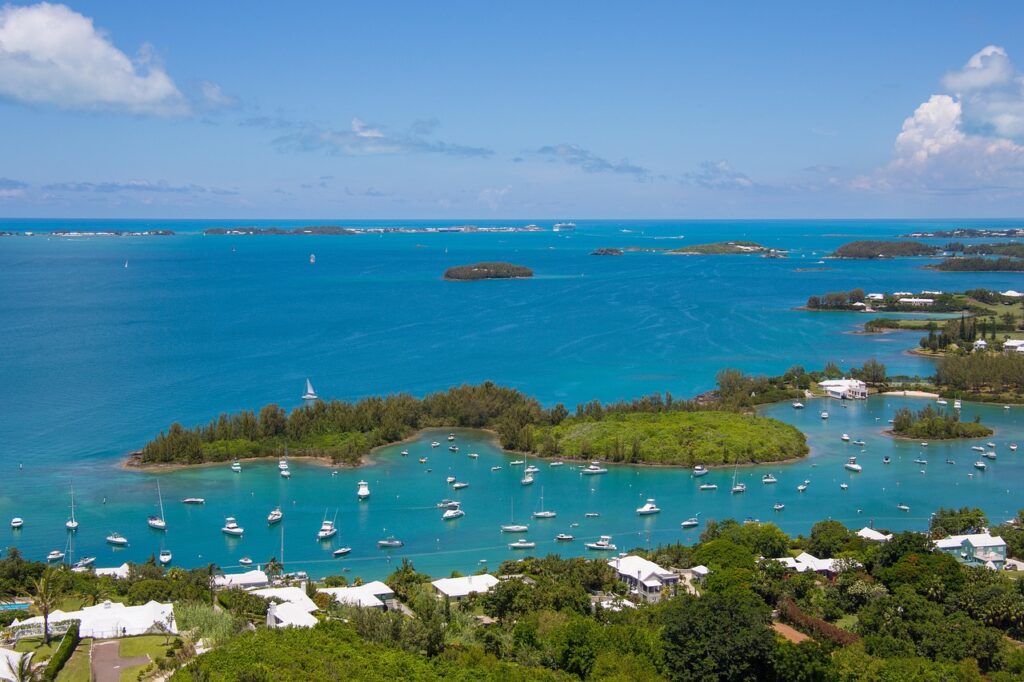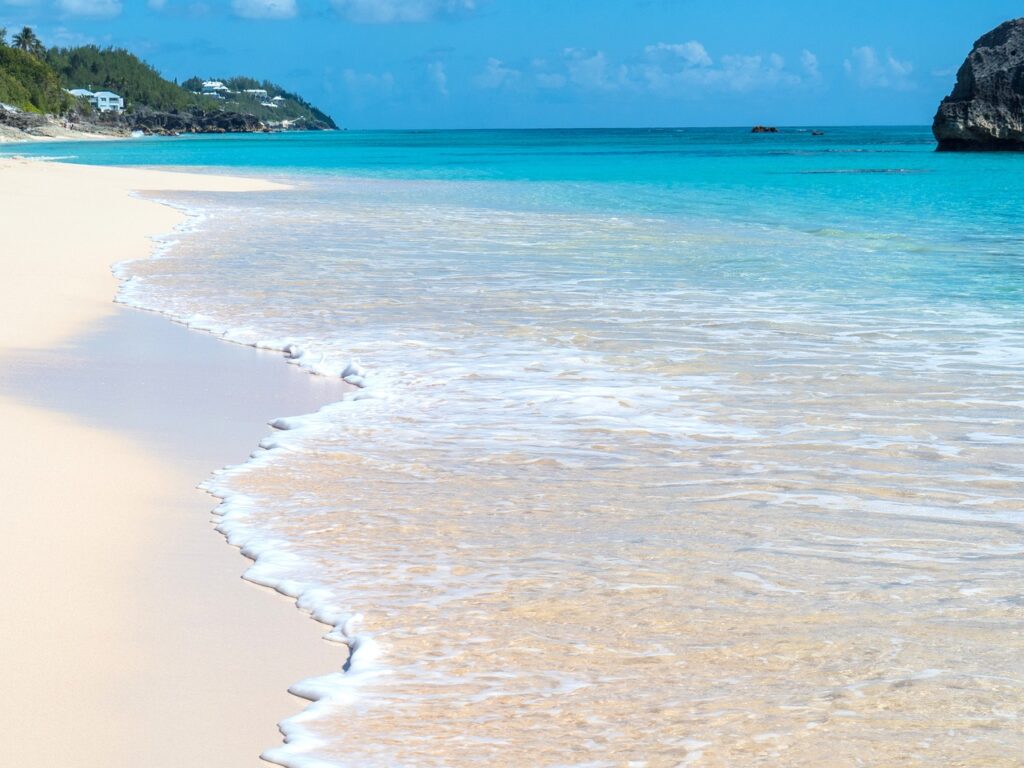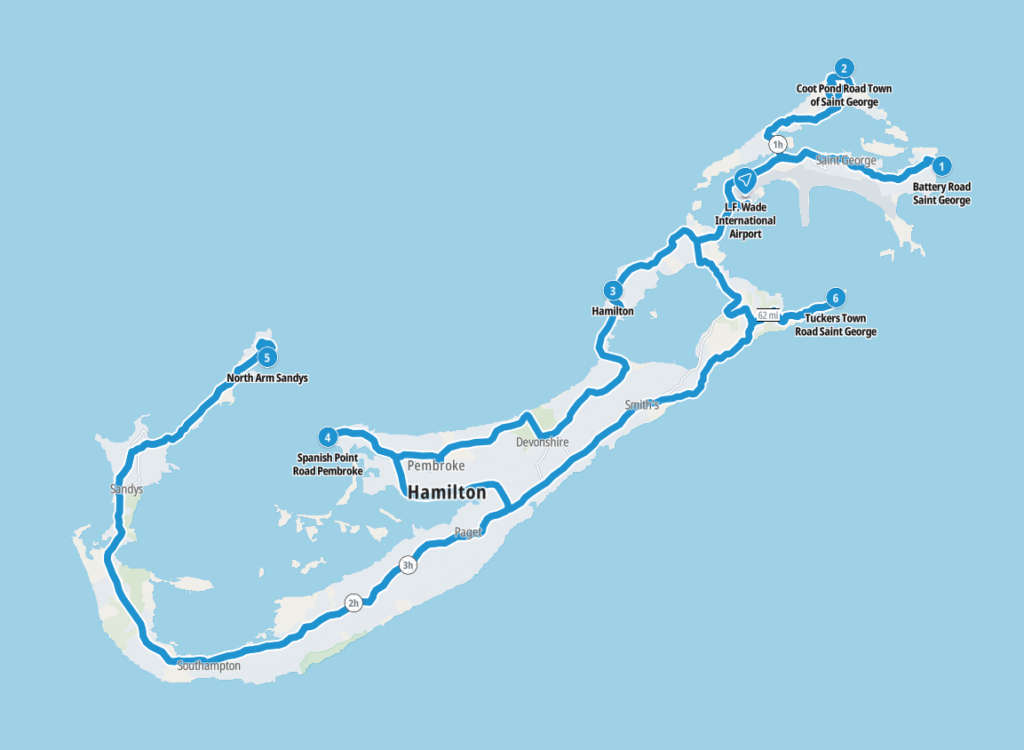Bermuda – Let’s explore here
What’s it like in Bermuda?
Bermuda is a remote set of around 180 volcanic islands, located in the North Atlantic Ocean in North America. As a British Overseas Territory, the British monarch is the head of state. It has a population of around 64,000 people (2019), only around 850 of whom live in the capital city, Hamilton.
Bermuda consists of a coral and limestone plain with no mountains. The largest island is Main Island, at 14 miles (23 km) long and 1 mile (1.6 km) wide. The highest peak is Town Hill, on Main Island, at 259 ft (79 m) above sea level.
Although Bermuda relies heavily on tourism like many of the islands in the Caribbean Sea, it is also a tax haven.

A bit about the history of Bermuda
Early History and Discovery
Bermuda was first discovered in 1505 by Spanish explorer Juan de Bermúdez, who gave the island its name. However, it remained uninhabited until the early 17th century. In 1609, the Sea Venture, a British ship en route to the Jamestown Colony in Virginia, was shipwrecked on the reefs off Bermuda. The survivors of the shipwreck established a settlement on the island, marking the beginning of English colonisation.
English Colonisation and Settlement
In 1612, the English formally established a colony on Bermuda, becoming one of the earliest British overseas territories. The island was initially used as a stopover for ships traveling between England and the Americas, but it eventually became a permanent settlement. The settlers focused on agriculture, particularly tobacco cultivation, though the island’s small size made it unsuitable for large scale farming. The economy of Bermuda grew through the production of shipbuilding materials, and the island became a hub for maritime trade.
Slavery and the Economy
Like many colonies in the Americas, Bermuda became reliant on enslaved Africans to work in agriculture and other industries. Slavery was introduced in Bermuda in the 17th century, and enslaved Africans were used to work on plantations growing tobacco, cotton, and later, other crops. Slavery was not fully abolished until 1834, when the British Empire passed the Slavery Abolition Act. The legacy of slavery and the African diaspora has continued to shape Bermuda’s social and cultural identity.
Political and Social Development
In the 18th and 19th centuries, Bermuda continued to prosper economically through maritime trade, shipbuilding and as a strategic naval base for the British during the American Revolution and the War of 1812. During this time, Bermuda’s population remained relatively small, but its importance as a British naval station kept it significant in the context of the British Empire. In the 19th century, Bermuda’s political structure evolved with the creation of a representative government, although the island was still governed by British-appointed officials.
20th Century and Modernisation
Bermuda’s economy underwent significant changes in the 20th century, transitioning from agriculture and maritime trade to tourism and finance. The island’s proximity to the United States and its status as a British Overseas Territory made it an attractive location for businesses and tourists. During both World Wars, Bermuda served as an important military base for the British and later the United States. After World War II, tourism became the island’s primary industry, and its economy shifted toward services, banking and insurance.
Post-War and Self-Governance
Throughout the 20th century, Bermuda gradually gained more self governance while remaining a British Overseas Territory. The island’s first constitution, adopted in 1968, established a more autonomous government, with an elected legislature and a premier. However, Bermuda still remains under British sovereignty, with the British monarch serving as head of state. Political debates on the island often centre around its relationship with the United Kingdom, and while some advocates push for independence, the majority of Bermudians continue to support the status of the island as a British Overseas Territory.
Contemporary Bermuda
Today, Bermuda is a thriving economy with a strong tourism industry, a major international finance sector and a high standard of living. It is a popular destination for tourists, especially those from North America, attracted by its picturesque landscapes, mild climate, and rich history.

Bermuda road trip
Bermuda is our 30th and final planned stop on our road trip through the islands of the Caribbean. Having explored Cuba, our next stop is the UK.
Travelling overland between the islands is quite prohibitive due to the lack of transportation options. Travelling between different island countries via ferry is possible, however, ferries only operate between some islands. Chartering private boats between islands is also possible, although travelling with a car in this way is prohibitive. Flying is another option, although again, flights only operate between some islands.
Map of our road trip through Bermuda

This is a map of our planned route around the island of Bermuda, starting and ending in the airport.
Weather in Bermuda
When is the best time to visit Bermuda?
The best time to visit Bermuda is from April to May. During these months, the islands have 8 hours of sunshine per day and rainfall of 3.4 – 3.7 inches (87 – 95mm) per month. The temperature ranges from 17 – 24°C (63 – 76°F).
When is the worst time to visit Bermuda?
The worst time to visit Bermuda is from August to October. During these months, the islands still have 7-9 hours of sunshine per day. However, humidity rises and it rains an average of 5.7 – 6.5 inches (145 – 165mm) per month. The temperature ranges from 22 – 30°C (72 – 86°F).
Hurricane Season in the Caribbean
Hurricane season runs from June 1 to November 30. Storms tend to be more frequent and more severe in the latter half of the season.
Hurricanes are least likely during December, January and February.
Travel in and around Bermuda
Ferries to other countries from Bermuda
There are no ferries to other countries from Bermuda.
What’s it like to drive in Bermuda?
Non-residents are prohibited from driving cars on the islands. Public transport and taxis are available. Taxis displaying a blue flag are registered tour guides. Visitors can also rent scooters.
They drive on the left hand side of the road in Bermuda. The majority of the roads in Bermuda are in fairly good condition.
We’ve also created a dedicated page to driving abroad, which you might find helpful 🙂
What currency do they use in Bermuda?
In Bermuda they use the Bermudian dollar, although the US dollar is widely accepted. Cash is widely used. The use of credit / debit cards is widely accepted in tourist areas. Travellers cheques are not generally accepted. There are many ATMs in tourist areas, although not all accept foreign issued cards.
You should make yourself aware of the amount that your bank charges you for using credit and debit cards abroad. Often credit cards are cheaper for purchasing items directly, and for withdrawing cash from ATMs.
What language do they speak in Bermuda?
They speak English in Bermuda. Portuguese is also quite widely spoken.
What time zone is Bermuda in?
Remember, when you’re planning your next trip to take a look at what time zone it’s in.
Do I need a visa to visit Bermuda?
We’ve created a dedicated, more comprehensive page on visas, which you should find helpful. Check it out!
Is wild camping legal in Bermuda?
No, wild camping is illegal in Bermuda.
What plug / socket type do they use in Bermuda?
In Bermuda they use plug / socket types A and B.


Health issues in Bermuda
Is it safe to drink water in Bermuda?
Yes, it is safe to drink tap water in Bermuda. Bottled water is also readily available across the country.
What vaccinations are required for Bermuda?
This NHS website is kept up to date with all relevant information on vaccinations in Bermuda.
Phones in Bermuda
What is the country calling code for Bermuda?
The country calling code for Bermuda is +1 441
What are the emergency phone numbers in Bermuda?
- The emergency number for police in Bermuda is: 911
- In Bermuda, the emergency number for ambulance is: 911
- The emergency number for fire in Bermuda is: 911
If you’ve got some useful info that you’d like to share, let us know!
And don’t forget to check out all the other pictures!
